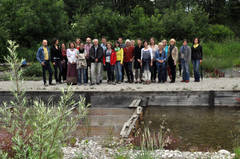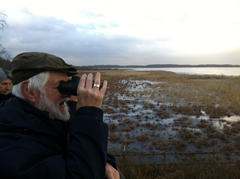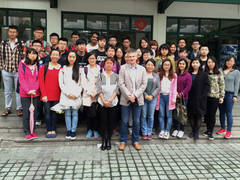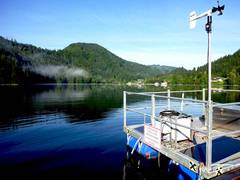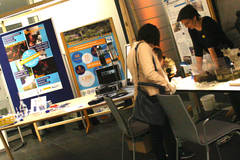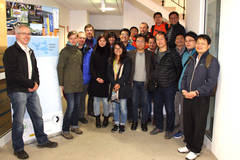With her project "Competition and top-down control as potential factors controlling microbial diversity in aquatic networks" Katharina Besemer got the first PostDoc Fellowship of WasserCluster Lunz. In June she started with her work in our research center, where she will do research for two years.
In our new project Wasser:KRAFT scientists from WasserCluster and Bioenergy 2020+, EVN and Hydro-Connect work togehter with children end students from kindergarten to secondary school, to give them an understanding of how important the resource water is.
We are very sad that our friend, colleague, and supporter, Professor Brian Moss, former president of the International Society for Limnology, passed away on May 27. We would like to send our deepest sympathy to his wife Joyce and their daughter Angharad. We remember Brian as a very thoughtful and passionate limnologist, writer, thinker, and above all a person of encouragement who, always together with his friends and colleagues, supported our research station. Thank you very much, Brian, for your support that we appreciate a lot!
The team of WasserCluster Lunz, Austria
From May 9th to 16th WasserCluster working group leader Martin Kainz was as guest lecturer at Tongji University, Shanghai. The objective of his intensive course was aquatic food webs and ecotoxicology, topics which were very appreciated by the chinese students.
Extreme weather events can have a remarkable influence on aquatic ecosystems, because they can import huge amounts of terrestrial dissolved organic matter (tDOM) and reset the vegetation. In Taiwan these landslides scars are often inhabited by bamboos, which have better abilities in root competition and reproduction. With the expansion of bamboo, consequently an increase in bamboo A level horizon soil (BAS) can be expected, which is different from evergreen broad-leaved A soil horizon (EAS) in the nutrient and carbon content.
Kathrin Krennmayr wrote - under the supervision of Thomas Hein - her master thesis about this topic. The goal of the master thesis was to see whether the distinct tDOM pools result in different rates of microbial degradation in aquatic systems. In May Kathrin Krennmayr successfully finished her thesis.
In a field study Samiullah Khan investigated - under supervision of Martin Kainz and Thomas Hein - how particulate organic matter (POM) and dissolved organic matter (DOM) quantity and its biochemical quality changed between lake inflow and outflow as well as within the oligotrophic Lake Lunz from 2013 to 2015. In April he successfully finished his thesis with the title „Biochemical characterization of particulate and dissolved organic matter in pre-alpine Lake Lunz“.
A lot of interested guests visited the station of WasserCluster Lunz at the Long Night of Research on April 22nd. WasserCluster Lunz presented current research projects at the "Institute of Science and Technology Austria - IST Austria" in Klosterneuburg and at the Danube University Krems.
At WasserCluster Lunz we welcomed on April 14th around 20 taiwanese collegues who visited the research center in the course of an excursion. The taiwanese scientists stayed in Austria for a seminar funded by the FWF an discussed with the WasserCluster scientists present and future joint projects.





